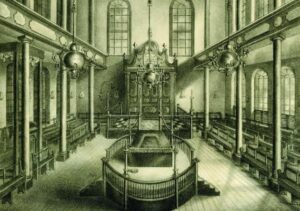| Source (Hebrew) | Adaptation (English) |
|---|---|
שִׁ֥יר הַֽמַּעֲל֗וֹת לְדָ֫וִ֥ד הִנֵּ֣ה מַה־טּ֭וֹב וּמַה־נָּעִ֑ים שֶׁ֖בֶת אַחִ֣ים גַּם־יָֽחַד׃ | Sweet the mutual love that’s glowing, In each brother’s conscious breast; Its gentle stream so mildly flowing, Ever blessing, ever blest. Hallelujah, hallelujah, hallelujah, Amen. |
כַּשֶּׁ֤מֶן הַטּ֨וֹב ׀ עַל־הָרֹ֗אשׁ יֹרֵ֗ד עַֽל־הַזָּקָ֥ן זְקַֽן־אַהֲרֹ֑ן שֶׁ֝יֹּרֵ֗ד עַל־פִּ֥י מִדּוֹתָֽיו׃ |
Sweet as the fragrant balsam pouring On the pious Aaron’s head, Till the sacred vestments streaming, Round their breathing odors shed. Hallelujah, Amen. |
כְּטַל־חֶרְמ֗וֹן שֶׁיֹּרֵד֮ עַל־הַרְרֵ֢י צִ֫יּ֥וֹן |
As morning dews on Ẓion’s mountain, Glitter in the orient rays, Or sparkling gem the verdant cedars Hermon’s holy top displays. Hallelujah, Amen. |
כִּ֤י שָׁ֨ם ׀ צִוָּ֣ה יְ֭הֹוָה אֶת־הַבְּרָכָ֑ה חַ֝יִּ֗ים עַד־הָעוֹלָֽם׃ |
To such the Lord of love and mercy Blessings ever shall extend; On earth — a life of tranquil pleasure, In heaven — a bliss that ne’er shall end. Hallelujah, Amen. |
“Brotherly Love” appears as Hymn 22 in The Sabbath service and miscellaneous prayers, adopted by the Reformed society of Israelites, founded in Charleston, S.C., November 21, 1825 (1830, Bloch: 1916), p. 64. According to Isaac Harby the hymn is an adaptation of Psalms 133. Gary Zola writes that the prayer was written by David Carvalho for the Society as indicated in Abraham Moïse’s annotated copy of the 1830 prayerbook.[1] Find, “The First Reform Prayerbook in America” (p. 116 ft. 32) in Platforms and prayer books: theological and liturgical perspectives on Reform Judaism (2002) Many thanks to the American Jewish Archives for providing access to the Carvalho Holograph, the earliest attestation we know of for this hymn. –Aharon Varady
Source(s)

Notes
| 1 | Find, “The First Reform Prayerbook in America” (p. 116 ft. 32) in Platforms and prayer books: theological and liturgical perspectives on Reform Judaism (2002) |
|---|

“Brotherly Love, an adaptation of Psalms 133 by David Nunes Carvalho (Reformed Society of Israelites, Charleston, South Carolina, 1826)” is shared through the Open Siddur Project with a Creative Commons Public Domain Dedication 1.0 Universal license.





Leave a Reply